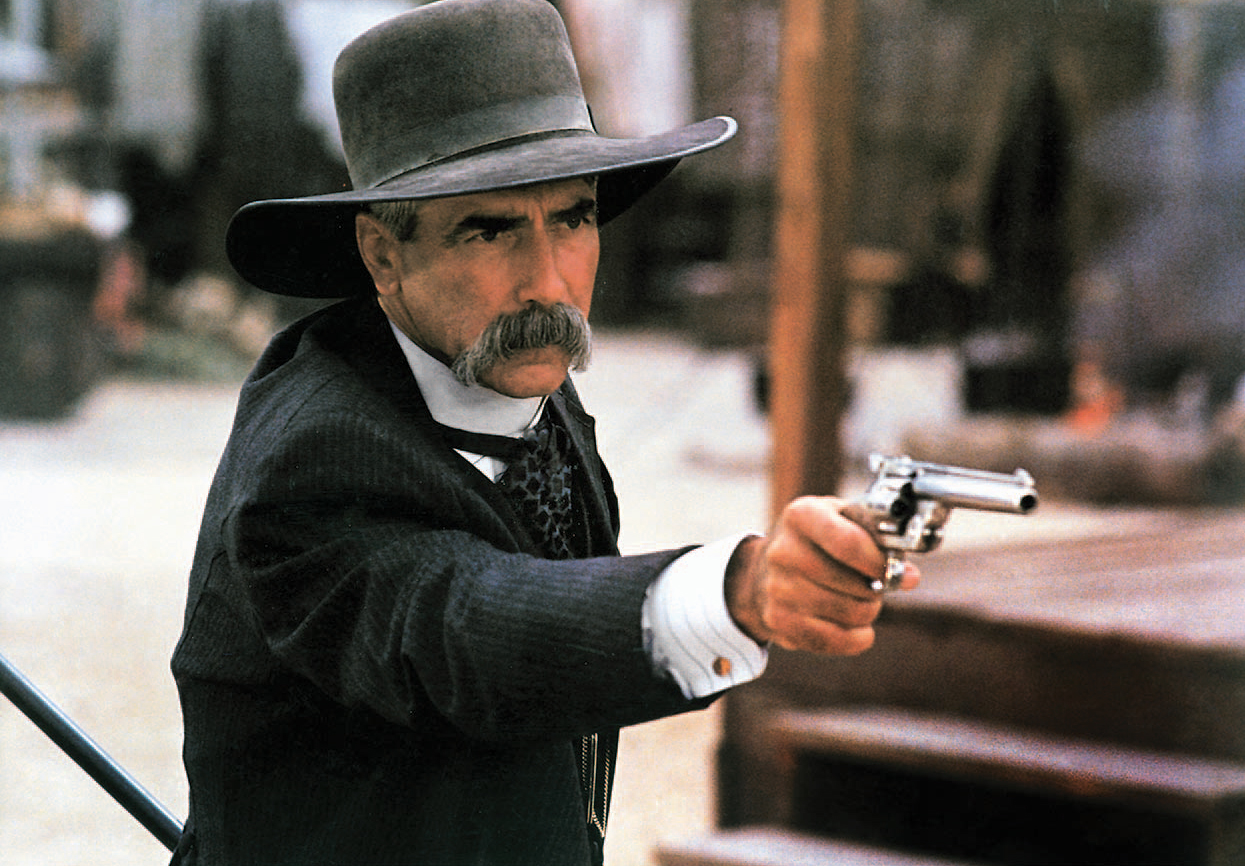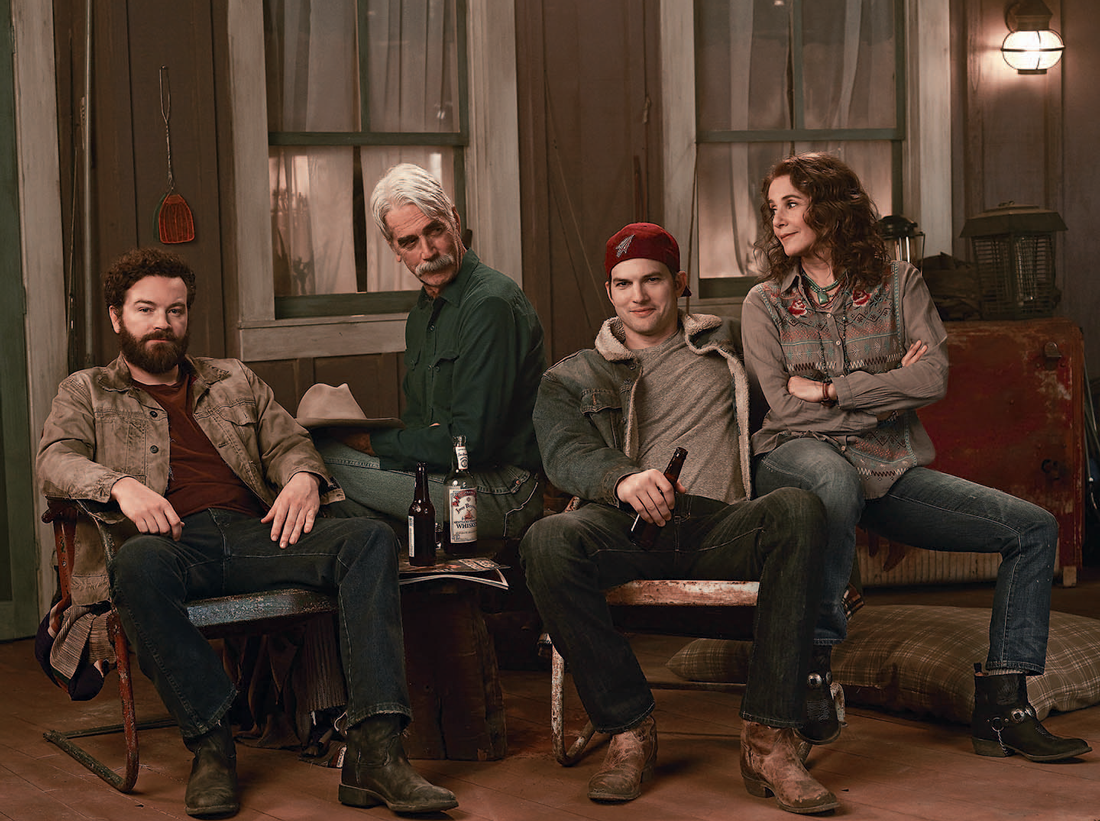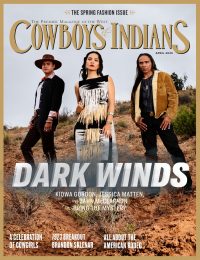The man with the mesmerizing voice and our favorite handlebar mustache stars in the new Netflix series “The Ranch.”
Sam Elliott has been making memorable westerns for five decades, beginning with his work as an extra with Kirk Douglas and Robert Mitchum in the 1967 film The Way West and as Card Player #2 in Butch Cassidy and the Sundance Kid. Numerous roles followed, from playing Virgil Earp in the beloved Tombstone to his Critics’ Choice award-winning role as Avery Markham in the FX series Justified, not to mention voiceovers for Ram and Coors.

So he was the ideal choice to play a modern-day Western dad in the new Netflix series The Ranch.
“I’ve been a huge fan of Sam Elliott — one of my all-time favorite movies is Tombstone,” says Ashton Kutcher (That ’70s Show, Two and a Half Men), the show’s star and executive producer. “He’s basically been this kind of brilliant, gruff guy [onscreen]. You watch him in a western, and you totally believe he is that guy.”
“We basically wrote the character for Sam Elliott, thinking we would find some version of him,” says Danny Masterson, who played Hyde to Kutcher’s Kelso on That ’70s Show and is costarring and coproducing here. “And then Sam said he would do it, so we were shocked.”
The show revolves around former high school football star Colt Bennett (Kutcher), who returns home to his family’s Colorado ranch after 15 less-than-stellar years of trying to make it as a semipro quarterback. Now that he’s hung up his football helmet, the real headbutting begins — as Colt contends with his cantankerous, my-way-or-the-highway dad, Beau (Elliott), and his adoring/deploring older brother, “Rooster” (Masterson), who’s never left the ranch and never will. Running the local saloon is Colt’s mom, Maggie (Debra Winger), who left Beau a few years ago but drops by the ranch to see her boys — and have an occasional roll in the hay with the semi-estranged husband who clearly wants her back.
Elliott credits his costars with the show’s immediate endorsement. “Both guys are masters at doing this kind of show, and I bow down to them,” he says with admiration. “The series was sold on a concept, and Netflix committed to 20 episodes right out of the gate.” And he can’t speak highly enough about the rest of the creative team, including director David Trainer, who helmed nearly 200 episodes of That ’70s Show; Jim Patterson, who served as a writer and producer on That ’70s Show and Blossom; and Don Reo, who started his career as a writer on Laugh-In and as a producer and writer on the classic M*A*S*H and was co-showrunner with Patterson on Two and a Half Men.
From the first scene, it’s clear that the show happily veers away from the usual giddy sitcom mechanics into more shaded comedy territory. Even dramedy at times. Dry humor and sharp one-liners are spiked with (be warned) many a judiciously placed expletive — batted around by characters dealing with life with open beers in hand. Think toned-down Two and a Half Men in ranch country with drinking, swearing, shattered football dreams, marital strife, residual father-son stuff — and Sam Elliott. And you’re somewhere near The Ranch.

The show, which premiered in April and has already been renewed for a second season, plans to deliver lots of laughs with the release of its first 10 episodes, with the second half of the “season” to follow later in the year. Many of the biggest laughs belong to Elliott, who makes good use of his masterfully wry one-liners and patentable deadpan expressions that say it all without so much as a word.
I caught up with Elliott at his home in Malibu, California, to chat about his latest project. But I was surprised to find that he seemed reluctant in some ways to talk about his storied career. I asked him if it was because he doesn’t like talking about himself.
“Not really,” Elliott replied. “I just think it’s all been said over the years. There’s really nothing more to talk about here.”
I beg to differ.
For more on Sam Elliott, pick up our July 2016 issue on newsstands now, and read our web exclusive about Sam Elliott’s wife, actress Katharine Ross, and how she combined her love of painting and horses to benefit wild mustangs.
From the July 2016 issue.












